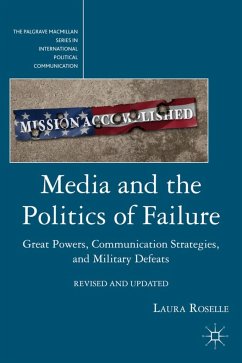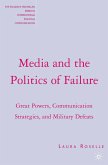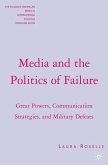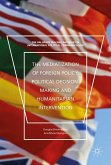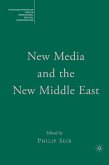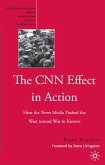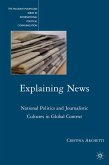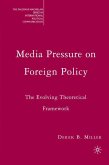'This is a great little text. It is original, concisely written, packs a lot of argument and data into just 190 pages, and draws on some unusual primary sources.' - Media, War, & Conflict
'In this fascinating study, Laura Roselle compares how political leaders in the United States and the Soviet Union developed a media strategy to minimize or camouflage the failure of their war policies. She does this through extensive comparative content analysis, archival work, high-level interviews, and a thorough mining of the literature on both sides regarding the American withdrawal from Vietnam and the Soviet exit from Afghanistan. Though the structures and practices of the two media systems could not have been more different, Roselle's work breaks new ground with solid evidence of how the two nations' dilemmas resembled each other in multiple ways.' - Ellen Mickiewicz, James R. Shepley Professor of Public Policy Studies and Director, DeWitt Wallace Center for Media and Democracy, Terry Sanford Institute of Public Policy, Duke University
'What happens to powerful nations when they lose wars? Although Vietnam and the Soviet invasion of Afghanistan remain painful failures in the national psyches of the U.S. and Russia, virtually no research has been done to compare these experiences. Laura Roselle has provided a unique and insightful comparison of how two political Leviathans attempted to control information flow about unsuccessful wars. In her study of Soviet newsmanagement of the Afghanistan War and the U.S. presidential struggle with Vietnam, she reveals critical power linkages among the executive, the media and the public. In exploring this relationship, Roselle sheds light on the complex and nuanced relationship between political leaders and the image of their countries that they struggle to project. This study is particularly valuable at a time when leaders of major countries again attempt to use conflict - in Chechnya and Iraq in particular - to project a particular image of the nation. The study uses detailed primary sources, down to the notes scrawled by President Richard Nixon in the margins of memos and interviews with key Russian politicians, to show the slow and painful battle that Nixon, President Lyndon B. Johnson and Soviet leader Mikhail Gorbachev found their experience as their superpowers lost in combat to smaller nations. Roselle uses these pieces of dramatic Soviet and American history to consider the price of military failure for leaders. The lessons learned from Vietnam and Afghanistan shed important light on the dangerous dynamic of foreign policy, military intervention and a leader's attempt to retain popular support. This is a compelling, well-written work from a scholar expert in war coverage, the Soviet media and the post-Cold War media sphere.' - Sarah Oates, Senior Lecturer of Political Science, University of Glasgow
'In this fascinating study, Laura Roselle compares how political leaders in the United States and the Soviet Union developed a media strategy to minimize or camouflage the failure of their war policies. She does this through extensive comparative content analysis, archival work, high-level interviews, and a thorough mining of the literature on both sides regarding the American withdrawal from Vietnam and the Soviet exit from Afghanistan. Though the structures and practices of the two media systems could not have been more different, Roselle's work breaks new ground with solid evidence of how the two nations' dilemmas resembled each other in multiple ways.' - Ellen Mickiewicz, James R. Shepley Professor of Public Policy Studies and Director, DeWitt Wallace Center for Media and Democracy, Terry Sanford Institute of Public Policy, Duke University
'What happens to powerful nations when they lose wars? Although Vietnam and the Soviet invasion of Afghanistan remain painful failures in the national psyches of the U.S. and Russia, virtually no research has been done to compare these experiences. Laura Roselle has provided a unique and insightful comparison of how two political Leviathans attempted to control information flow about unsuccessful wars. In her study of Soviet newsmanagement of the Afghanistan War and the U.S. presidential struggle with Vietnam, she reveals critical power linkages among the executive, the media and the public. In exploring this relationship, Roselle sheds light on the complex and nuanced relationship between political leaders and the image of their countries that they struggle to project. This study is particularly valuable at a time when leaders of major countries again attempt to use conflict - in Chechnya and Iraq in particular - to project a particular image of the nation. The study uses detailed primary sources, down to the notes scrawled by President Richard Nixon in the margins of memos and interviews with key Russian politicians, to show the slow and painful battle that Nixon, President Lyndon B. Johnson and Soviet leader Mikhail Gorbachev found their experience as their superpowers lost in combat to smaller nations. Roselle uses these pieces of dramatic Soviet and American history to consider the price of military failure for leaders. The lessons learned from Vietnam and Afghanistan shed important light on the dangerous dynamic of foreign policy, military intervention and a leader's attempt to retain popular support. This is a compelling, well-written work from a scholar expert in war coverage, the Soviet media and the post-Cold War media sphere.' - Sarah Oates, Senior Lecturer of Political Science, University of Glasgow

